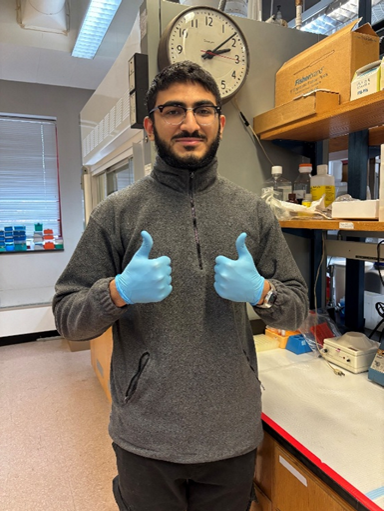My capstone project was a dive into the fascinating field of gene regulation. Gene regulation is the process by which the information encoded in our DNA is translated into the diverse characteristics that make us who we are. My research specifically focused on the INO80 chromatin remodeling complex and its role in this complicated process.
The question that drove my work was identifying the exact lysine residue within the INO80 complex that undergoes acetylation, a modification known to play a key role in influencing gene expression.
Looking back on the experience, my initial interest in gene regulation stemmed from classes like the Biology of Disease and Genetics. These classes opened my eyes to how cells coordinate gene expression and how disruptions can lead to the diseases and conditions we see in our everyday lives.
Though I was very excited to tackle my project when it first began, and I started with a clear framework, my work also involved navigating unexpected challenges. Without a doubt, the most difficult aspects of the research were fine-tuning the PCR conditions. Achieving the correct annealing temperatures for primer binding and troubleshooting inconsistent results required persistence and analytical thinking. In contrast, the earlier stages of sample preparation were relatively straightforward.
One of the most surprising things for me was the sheer amount of troubleshooting characteristics in molecular biology research. I learned that scientific progress often involves overcoming obstacles and adapting experimental strategies. My experiences in the lab were also very different from what I expected. Long hours were spent running tests and waiting for results. However, all the benchwork I performed helped me gain much experience in the kind of tests performed in the field of genomics.
Several different routes could be taken in terms of future research directions with my project. Investigating the specific enzymes responsible for INO80 acetylation would provide valuable insights into the regulatory mechanisms at play. Furthermore, it would be interesting to examine how this acetylation is influenced by various cellular signals and map out the protein-protein interactions mediated by the identified lysine residue.
The capstone experience has been enriching, providing me with invaluable skills and insights. I've honed my abilities in molecular biology techniques, developed my problem-solving skills, and cultivated a deeper appreciation for the scientific process. Beyond the technical expertise, this research has reinforced my passion for scientific inquiry and its potential to make meaningful contributions to advancing human health. As someone pursuing a BS/ MS in Biology on the Pre-med track, this project allowed me to explore the foundational science that supports human health and disease. As I progress in my pre-med track, I am eager to integrate this research foundation with my clinical experiences to provide comprehensive, cutting-edge care to future patients.
























